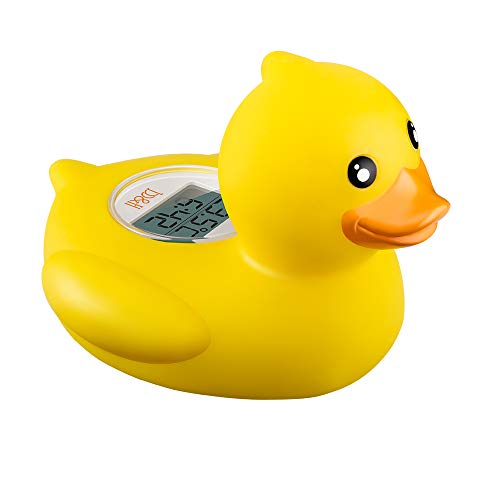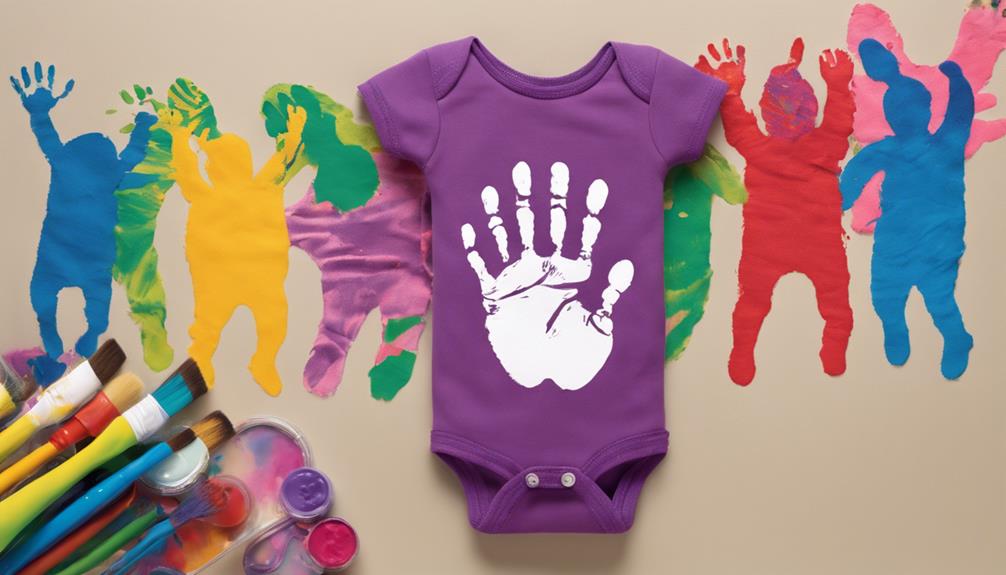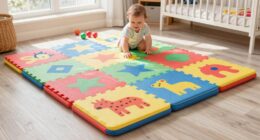So, parents, let's get down to brass tacks when it comes to helping your newborn with their bowel movements.
We all know how important it is for our little ones to stay regular, but sometimes it can be a real head-scratcher. What if we told you there are simple yet effective ways to tackle this challenge?
Stick around to uncover the essential tips that could make a real difference for your baby's comfort and well-being.
Key Takeaways
- Gentle massages and warm baths can stimulate newborns' bowel movements.
- Consistent feeding schedules help regulate and promote healthy pooping habits.
- Recognize symptoms of constipation early to prevent complications and discomfort.
- Consult healthcare professionals for guidance on managing and relieving newborn constipation.

Johnson's Baby Oil, Pure Mineral Oil to Prevent Moisture Loss for Newborn, Kids, and Adults, Gentle and Soothing Baby Massage Oil, Dry Skin Relief, Hypoallergenic, Original Scent, 3 fl. oz
3-fluid ounce bottle of pure baby mineral oil formulated to help moisturize babies' delicate skin, and gently protect…
As an affiliate, we earn on qualifying purchases.
As an affiliate, we earn on qualifying purchases.
Importance of Healthy Bowel Movements
Ensuring regular and healthy bowel movements for your newborn is important for their overall well-being and development. A baby's bowel movements can provide valuable insights into their health, with changes in frequency, consistency, and color indicating potential issues. For newborns, who primarily feed on breast milk or formula, bowel movements are an important aspect of their daily routine. Breast milk contains essential nutrients that are easily digestible, leading to softer stools compared to formula-fed babies.
Proper bowel movements help prevent constipation, a common concern in infants, which can cause discomfort during diaper changes and feeding. It's essential to pay attention to your baby's poop patterns to detect signs of constipation early on. Hydration also plays a significant role in maintaining healthy bowel movements, so ensuring that your baby receives adequate water, especially in hot weather or during illness, is important.

b&h Baby Bath Thermometer, The Infant Bath Floating Toy Safety Temperature Water Thermometer, Baby Bath Essentials (Classic Duck)
Measuring water temperature in the bathtub and room. Not only a thermometer, but also a clock. baby thermometer…
As an affiliate, we earn on qualifying purchases.
As an affiliate, we earn on qualifying purchases.
Practical Strategies for Newborn Pooping
To support your newborn's healthy bowel movements, incorporating practical strategies can aid in promoting regularity and comfort. Here are some effective methods to help your baby poop:
- Gentle Massages: Using soft circular motions on your baby's belly can stimulate their digestive system and encourage bowel movements.
- Warm Baths: Bath time isn't just for cleanliness; warm water can help relax your baby's muscles and make it easier for them to poop.
- Light Exercise: Activities like gently moving your baby's legs in a cycling motion can help get things moving in their bowels.

PADONISE Wrist Rattle Foot Finder Socks Set for Baby Arm Hand Rattle Feet Leg Ankle Socks Newborn Soft Sensory Toys Baby Socks Newborn Rattles Toys Valentines Gift 0-3 6-12 Months Infant Girl Boy
Comfortable Materials- Made of Breathable Fabrics, Non-toxic Harmless, BPA Free, safe, And Passed the CPC Certification to Provide…
As an affiliate, we earn on qualifying purchases.
As an affiliate, we earn on qualifying purchases.
Understanding Baby Constipation
Baby constipation can be a common concern for parents, especially when noticing signs of discomfort in their little ones. Symptoms like hard stools, difficulty passing stools, and infrequent bowel movements may indicate constipation in babies.
Causes of baby constipation can include slow gut movement or digestive issues. When dealing with baby constipation, home care tips such as adjusting formula, adding dark fruit juice to their diet, offering water, and including high-fiber foods can be beneficial.
While over-the-counter medications like glycerin suppositories can help, it's important to consult a healthcare professional before using them on your baby. Understanding the underlying causes of baby constipation is essential, and if home remedies don't alleviate the issue, seeking medical advice is advisable.

Quality Choice Infants Glycerin Suppositories Laxative Relief 25 Ct Each (2 Pack)
As an affiliate, we earn on qualifying purchases.
As an affiliate, we earn on qualifying purchases.
Risks of Newborn Constipation

Newborn constipation presents serious risks to your baby's well-being, causing discomfort and potential complications if left untreated. This issue can lead to hard stools, infrequent bowel movements, and abdominal pain, making your little one irritable and fussy.
Untreated constipation may also result in complications like anal fissures or hemorrhoids, further distressing your newborn. Additionally, constipation in newborns can disrupt feeding patterns and sleep schedules, affecting their overall well-being.
Identifying constipation early on and implementing appropriate management strategies are essential to prevent long-term issues. By observing your baby's bowel movements and recognizing signs of constipation, you can take proactive steps to address the problem promptly.
Understanding the risks and potential complications associated with newborn constipation is vital for providing the necessary care and support for your little one's digestive health.
Dealing With Newborn Constipation
Recognizing the signs of constipation in your infant can guide you in effectively addressing the issue and providing relief. Newborn constipation is a common concern, often triggered by factors such as diet changes or dehydration.
To help your baby, consider gently massaging their belly in a clockwise motion to stimulate bowel movements. For babies older than 4 months, offering small amounts of water can aid in relieving constipation. Additionally, incorporating high-fiber foods like prunes, peas, or whole wheat cereal into your baby's diet can promote regular bowel movements.
Consulting a doctor before trying over-the-counter remedies or medications for newborn constipation is crucial to proper care. Your healthcare provider can offer guidance tailored to your baby's specific needs and medical history. By taking proactive steps and seeking professional advice when needed, you can effectively manage and alleviate your newborn's constipation.
Frequently Asked Questions
How Can I Encourage My Baby to Poop?
We can help encourage your baby to poop by promoting movement like gentle leg bicycling, offering tummy massages, ensuring hydration, and providing tummy time. Consulting a pediatrician is important for safe and effective methods.
What Can Mom Drink to Help Baby Poop?
Prune juice, herbal teas, and plenty of water can aid in baby's digestion. Avoiding caffeine and alcohol is important to prevent dehydration. Including fiber-rich foods in our diet indirectly benefits baby's digestion and helps prevent constipation.
What Is the 7 Second Poop Trick?
We gently rub a warm, moistened cotton ball on the baby's bottom for 7 seconds. This stimulates the rectum, aiding in a bowel movement. It mimics a diaper change, promoting poop. It's important to consult with the pediatrician and use gentle pressure.
How Do I Stimulate My Baby to Poop With Q Tips?
When we gently use a lubricated Q-tip to stimulate a baby's anus, we mimic the sensation of a rectal thermometer, aiding in triggering a bowel movement. It's important to be cautious and consult healthcare professionals before trying this method.
Conclusion
To sum up, helping your newborn poop is like nurturing a delicate garden – it requires care, attention, and the right tools. By staying consistent, introducing probiotics, and consulting with your pediatrician, you can create a healthy environment for your baby's bowel movements to thrive.
Remember, just like tending to a garden, a little patience and guidance can go a long way in ensuring your little one's comfort and well-being. Trust the process and seek help when needed.









